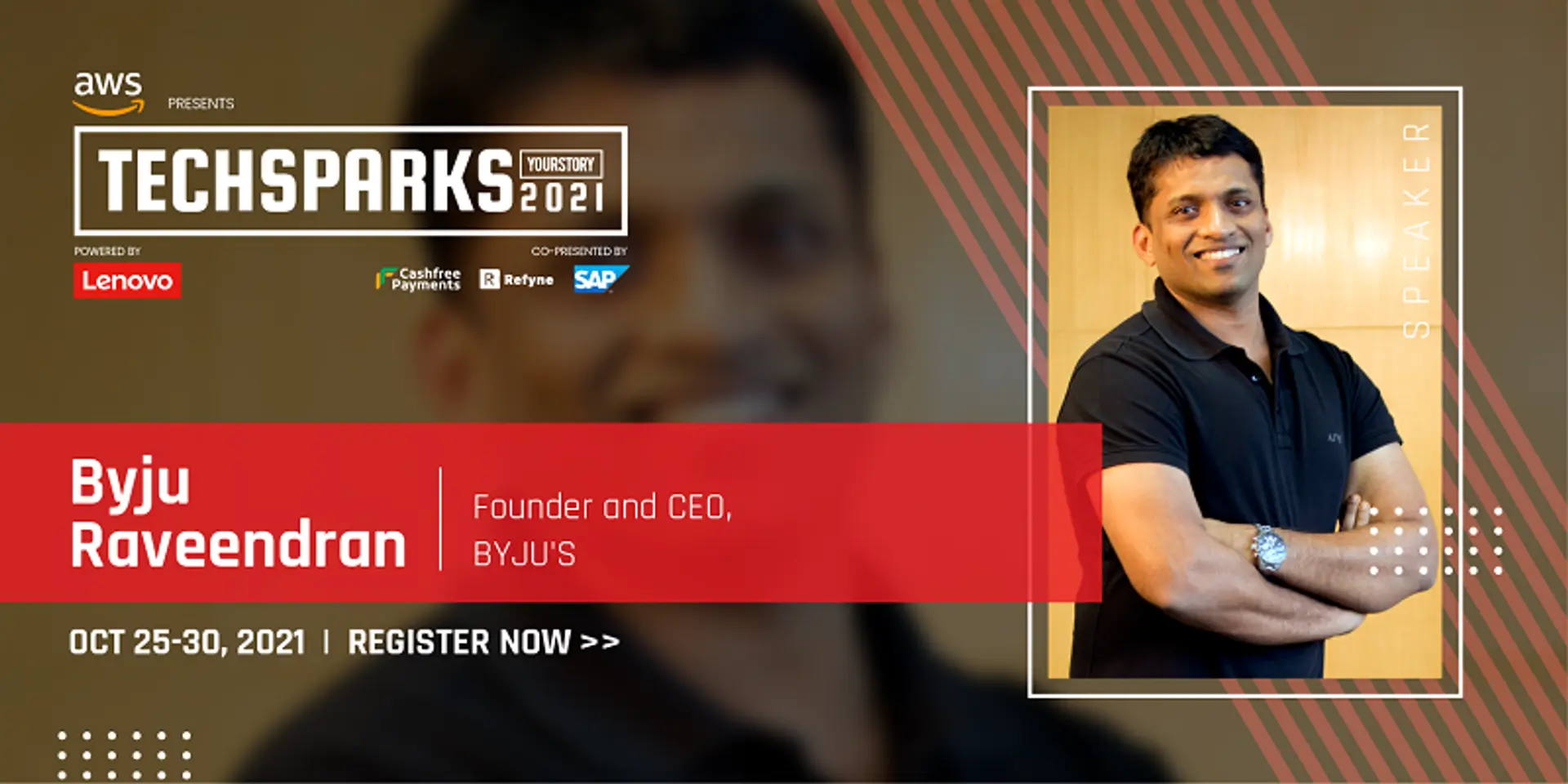Byju Raveendran on being the ‘BYJU’S of X’ and pioneering a movement in edtech
What is the BYJU’S benchmark that the Indian startup entrepreneurial ecosystem now aspires to attain and emulate? At TechSparks 2021, here’s what the builder of the Indian edtech empire had to say about accelerating online learning.
From competing with the gold standard of the “Uber effect” and the like to creating its own unique name and identity, and eventually to be measured against its own self-created standard, the tag “BYJU’S of X” is significant especially since we are talking about touching a million lives through education.
At TechSparks 2021, when Shradha Sharma, Founder and CEO of YourStory asked the leader of edtech decacorn (startups valued over $10 billion) how it feels to be known as the “BYJU’S of X”, Byju Raveendran, Co-Founder and CEO, , admitted that is makes him happy but without ever losing sight of the task in hand.

“It's (also) a huge responsibility when people talk about us as pioneers in a sector. This way, I'm very sure that this (edtech) will be one of those sectors which will be defined and hopefully owned by Indian startups,” explained Byju.
What are we to make of this mad rush to the BYJU’S app that has forever changed the Indian startup space?
“I would want to believe that when they talk about BYJU’s of X, what they mean is high-quality courses, where we find the right balance between keeping it engaging, making it easy for students without forgetting the fact that at the end of the day, it’s about creating learning outcomes,” added Byju.
The most important skill, however, is the skill of learning “how to learn”, feels the edtech pioneer, who is hopeful that the current inflection point is only the beginning and the best is yet to come.
For a company like BYJU’S with a long list of acquisitions and mergers, what are the rules of cross-border cultural integration especially with the need to constantly quality control the content and ensure its synergy and integrity? Cultural integration is overrated, said Byju, stressing the importance of leveraging the already built-in value of the acquired company and enabling them to attain entrepreneurial freedom rather than force-fit it. The teacher-turned-entrepreneur imparted an important lesson in honing the organic cultures of companies and their existing DNAs so as not to defeat the purpose of acquisition.
“Cultural integration is kind of overrated in these times of acquisitions and integrations because you are buying a company for a reason, so it's very important that you make sure that the company continues (with its own culture). It has its own culture and what got them from zero to one or one to 10, you just need to make sure it continues, otherwise, it’s better to build (it yourself). So we make sure that we don't integrate, we don't change the way the companies work. And in most cases, I’ve heard from founders after they come on board that they have more entrepreneurial freedom than what they had before,” explained Byju.
According to him, to be in a sector, which is ripe for positive disruption, demands deploying capital in ways that can create more value for its existing user base. If in the domestic market, BYJU’S capitalises on the India-built distribution channels, when it comes to integrations in the US, BYJU’S depends on its platforms for distribution.
The BYJU’S mantra lies in maintaining that fine balance between “outside support” and “inside intervention”, ensuring all its integrations are mutually complementing, creating “value for each other”. And, Byju terms it as “innovation”.
“More importantly, those founders are experts, because they know the students in those markets very well. And that's how it's been complementary,” said Byju, adding that in the edtech sector, it’s always better to find the right balance between organic and inorganic growth.
Technological disruption is at the heart of the BYJU’S playbook. There's a long way to go but the next 10-20-30 years are going to see paradigm shifts and improvements from the way students learn to the way teachers teach and the way institutions function online. “Everyone is bullish on India, everyone is bullish on education. And we are excited to be at the intersection,” added Byju.
The change has already begun to take shape in the landscape of learning. There’s a paradigm shift in the “mindset” or “attitude” when it comes to adopting the digital interface for learning and teaching. “It took a pandemic like this for all stakeholders to realise what online learning can be, whether it's our students trying out online learning like never before, or teachers using digital tools. In the initial days, I heard teachers talking about their struggle to create a PPT. Today, you will see them using a lot of technology platforms, which enables them to become better teachers. Institutions are going online, willing to offer more and more online programmes, and extending their reach. And a lot of them are offering them at a fraction of the cost of what they charge at universities,” pointed out Byju.
This leap is felt across segments, from the kids learning segment to the school segment, and even the most conventional of all, the test prep segment, which used to be an offline-first segment. The movement towards online learning has taken off. Byju highlighted the future of education will see a lot of hybrid programmes where there will be the “best of both” worlds — online and offline. The future lies in finding the right balance and achieving the rightly blended formats.
To log in to our virtual events platform and experience TechSparks 2021 with thousands of other startup-tech enthusiasts from around the world, join here. Don't forget to tag #TechSparks2021 when you share your experience, learnings and favourite moments from TechSparks 2021.
For a line-up of all the action-packed sessions at YourStory's flagship startup-tech conference, check out TechSparks 2021 website.

Edited by Dipti D



